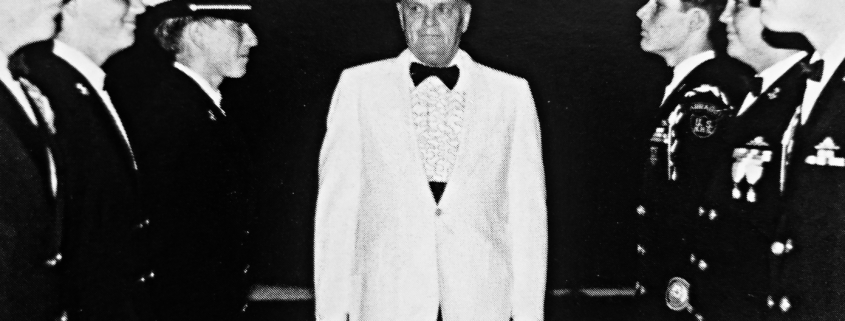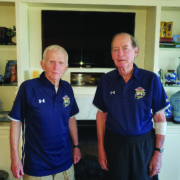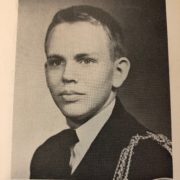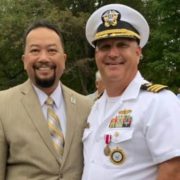Remembering CAPT Orie T. Banks, the Dean of Students at the southern campus from 1953-1987
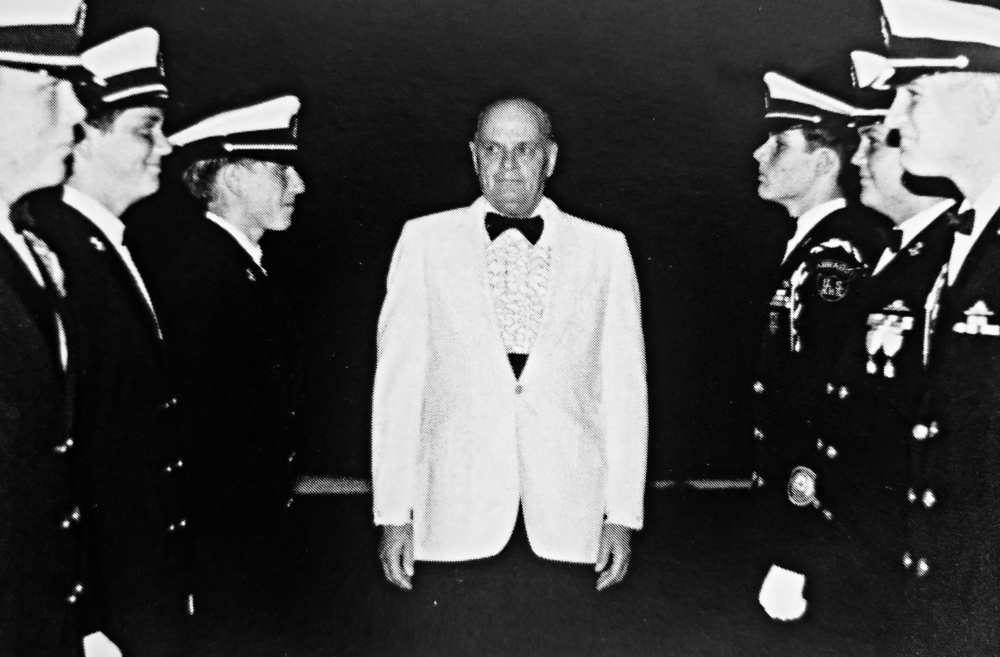
CAPT Orie T. Banks, the Dean of Students at the southern campus from 1953-1987, oversees cadets at a school dance.
During his 34 years of service, CAPT Banks had a profound impact on many cadets. Alumni remember his firm but wise teachings and have shared over the years the positive influence he had on their lives. Read the thoughtful reflection about “What a Boy Learns At Farragut” written by CAPT Banks.
“Capt Banks definitely had a positive influence on my life that extends into my family, friends, and others I interact with in life,” shared Philip Krick ‘80S.
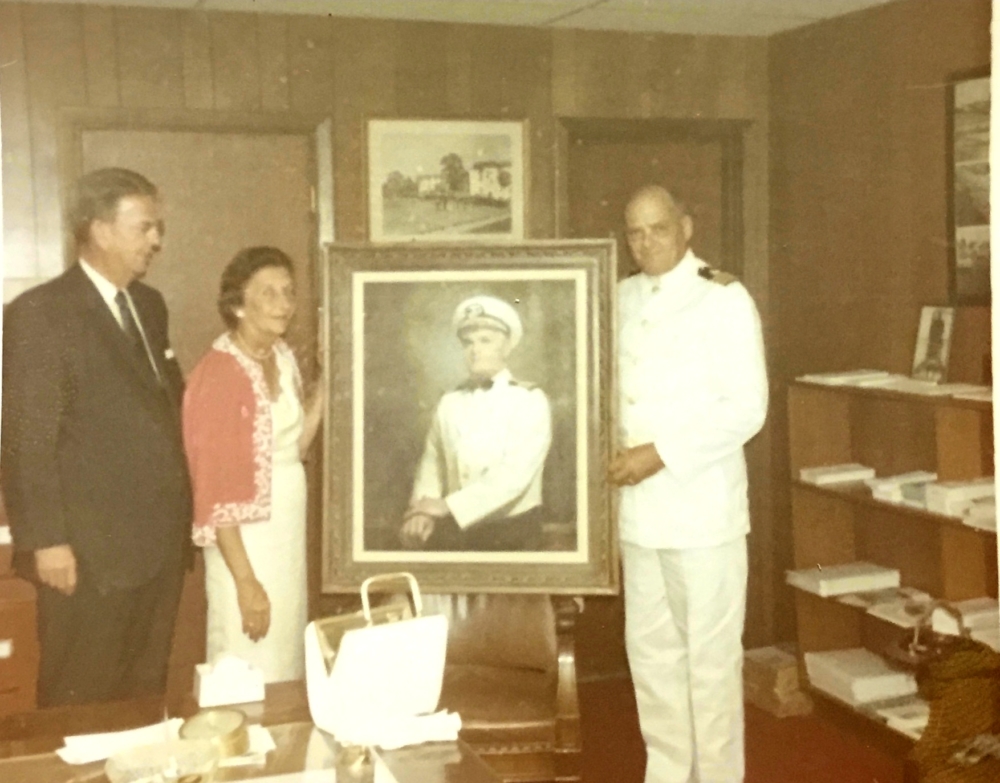
CAPT Orie T. Banks, the Dean of Students at the southern campus from 1953-1987, stands by his portrait
“What CAPT Banks wrote truly transcends the test of time and is still relevant today as we teach young men and women to strive for academic excellence and become leaders in a diverse community,” said Farragut Director of Alumni Relations Victoria Raymer who witnesses this through her very own children: Ashton ‘20, who now attends the Air Force Academy; Sophia ‘24; and Cole ‘25.
“What a Boy Learns At Farragut”
By: CAPT O.T. Banks, Dean of Students
Fifty percent of what a young boy learns in a school such as Admiral Farragut he learns from youngsters like himself. He learns by listening to and following the behavior habits of his teachers. All of them may not be good. But he is taught to weigh out everything he hears and sees on a screen of truth and accept only that part which falls through. It would be impossible to list every lesson a cadet will learn, but here are a few I am confident will be among the most worthwhile.
-
- He learns that life here is a mixture of good days and bad, victories and defeats, give and take. All must be accepted with grace.
- He learns that it doesn’t pay to be a sensitive soul – some things just have to be accepted whether he likes it or not.
- He learns that the easiest way to make enemies is to carry a chip on his shoulder. If he does, sooner or later somebody will knock it off.
- He learns the easiest way to become unpopular among his peers is to carry tales and gossip about others – no matter if they are true or not.
- He learns that most of the other cadets here, like himself, came from homes where they had things pretty well their own way and that they, like he, are all learning that their way of doing things need not necessarily be the only way some things can be accomplished.
- He learns that other fellows are usually just as ambitious as he, that they have intelligence too, and that while he may be down in class standing one moth, he can rise above it the next if he willingly works at it.
- He learns there are no short cuts to anything, no running away from problems, that the only way to solve them is to face and conquer them.
- He learns the fellows are no harder to get along with here than at the school he just came from – only he has to get along with them a few more hours out of each day and that “getting along” depends 95% upon himself and 5% on the ones he’s trying to get along with.
- He learns that the immortal men in baseball didn’t become immortal because they got a hit every time they came to bat; but that they got more hits than strikeouts.
- He learns that this year’s battalion commander was once a youngster just as frightened and homesick as he is right now, but that they got more hits than strikeouts.
- He learns that here at Farragut he becomes a member of the unit, and that this unit depends just as much upon him as any other member of that unit for its strength, and that no one likes to carry his part of the load.
- He learns that his teachers are only human beings just like himself, only grown a little older, spend many more years, and many more dollars preparing to become teachers than they have spent. They are usually more anxious to teach you than you are to learn. They have things to worry about a cadet doesn’t. You could help him now and then by doing some of the things you are inclined to ask him to do for you.
-
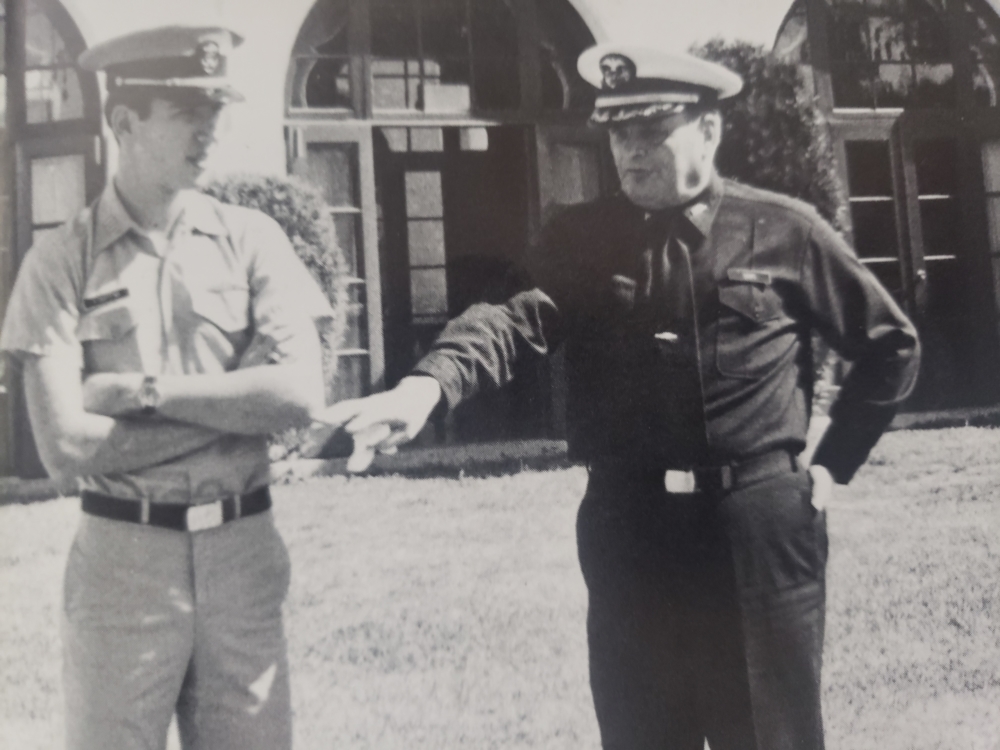
CAPT Banks giving his lesson to a deserving cadet.
- He learns that his parents sent him here because they wanted more for him than average. He is the center of their hopes, their dreams, and their pride. He might try compensating them a little now and then by doing some of the things they had to do in order to be able to send you here.
- He learns that no one ever built a reputation on what he intends to do and that somewhere there must be a beginning. It might be a wise idea to begin right here..NOW..where there are capable and willing people to guide him in the right channels.
- He learns that what he is to be someday he is now becoming. Every day he lays another block into the house he is someday going to have to live in, the temple in which he will spend his adult years, the home in which he will bring up his own children. Every dishonest act weakens the structure of that house.
- He learns that failures come more from a lack of determination than a lack of opportunity.
- He learns that what he will get out of Admiral Farragut depends directly in proportion to what he puts into it and that both depend somewhat upon knowing what he is going to have to sacrifice to get it.
- He learns that near the end of the year he may hear some cadets say, “this has been a wasted year.” Wasted years are nothing more than an accumulation of “wasted days”.
- He learns that one of the reasons so many cadets fail is that, by the very laws of nature, no one can sit down and slide uphill.
- He learns to build faith in himself; for unless he has this faith in himself, there is a good likelihood no one else will have faith in him.
- He learns that when people’s lives are committed to nothing in particular they usually accomplish what they are committed to.
- He learns that everybody here must pull his share of the load; and that no horse can pull while he is kicking.
- He learns that if he doesn’t get what he wants there is a very strong likelihood he either didn’t want it very badly or he tried to bargain too much over the price.
- He learned that nothing worthwhile ever accomplished came without some sacrifice on the part of the achiever. The willingness and the intensity of the sacrifice are in direct proportion to the achievement.
- Finally, he learns that these rules apply, not only here at Admiral Farragut, but anywhere in life where success is achieved.
These are only a few. When Abraham Lincoln’s mother was dying, while Abe bent his huge frame over her bedside, she reached up with her bony fingers stroking his beard whispered, “Be Somebody, ABE!” How often he told what motivation this was to him. Now I say to you, Cadets, “BE SOMEBODY!” And let me know anytime I can help you.

